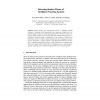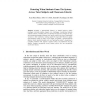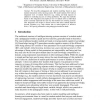7340 search results - page 2 / 1468 » The Behavior of Tutoring Systems |
ITS
2004
Springer
13 years 10 months ago
2004
Springer
Recent research has indicated that misuse of intelligent tutoring software is correlated with substantially lower learning. Students who frequently engage in behavior termed “gam...
UM
2005
Springer
13 years 10 months ago
2005
Springer
Building a generalizable detector of student behavior within intelligent tutoring systems presents two challenges: transferring between different cohorts of students (who may devel...
EDM
2010
13 years 6 months ago
2010
We describe pedagogical and student modeling based on past student interactions with a tutoring system. We model student effort with an integrated view of student behaviors (e.g. t...
HCI
2009
13 years 2 months ago
2009
This paper describes two affect-sensitive variants of an existing intelligent tutoring system called AutoTutor. The new versions of AutoTutor detect learners' boredom, confusi...
AIEDU
2006
13 years 5 months ago
2006
Tutoring systems are described as having two loops. The outer loop executes once for each task, where a task usually consists of solving a complex, multi-step problem. The inner lo...



